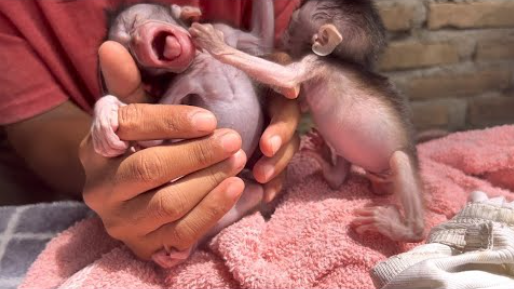Feeding and caring for newborn baby monkeys at home is a delicate and complex task that requires a thorough understanding of their nutritional, physical, and emotional needs. Baby monkeys, especially those that are very young or orphaned, need specialized care to ensure their survival and healthy development. If you find yourself in a situation where you need to care for baby monkeys, here’s a basic guide on what to do.
1. Assess the Situation: Before attempting to care for the monkeys, determine if they need immediate professional help. If you encounter orphaned baby monkeys or those that seem sick or injured, contact a wildlife rescue organization or a veterinarian specializing in exotic animals immediately. Baby monkeys are highly sensitive and can suffer from malnutrition, dehydration, or infections without the proper care.
2. Appropriate Feeding: Newborn baby monkeys generally rely on their mothers for nourishment, so you’ll need to replicate this as closely as possible. A suitable substitute for their mother’s milk is essential. Do not feed them cow’s milk, as it can be harmful. There are specially formulated primate milk replacers available that mimic the nutritional content of monkey milk. You can find these at pet stores or through veterinarians who specialize in exotic species. Follow the feeding instructions carefully, ensuring that the milk is the right temperature—lukewarm, not hot.
You may need to bottle-feed them every 2-3 hours during the first few weeks, including nighttime feedings. As they grow older, the frequency of feedings will decrease, and you can start introducing solid foods, such as fruits, soft vegetables, and specially prepared primate food pellets.
3. Temperature and Comfort: Baby monkeys cannot regulate their body temperature well, so you’ll need to keep them warm. Use a heating pad or a warm towel to ensure they stay comfortable. Make sure they are in a quiet, safe space away from loud noises and predators.
4. Socialization: Monkeys are highly social animals, and keeping them alone can cause emotional distress. If possible, try to care for them together, as their social bonds will help them thrive. Additionally, ensure that they receive gentle handling to promote proper development, but avoid overstimulating them.
Remember that raising baby monkeys at home is a significant responsibility and requires consistent care and attention. Always consult a wildlife professional to ensure you are providing the best possible care for them.
